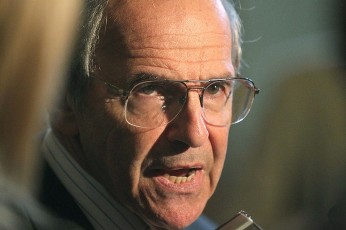Sudan rejects former US envoy’s talk of delaying 2015 elections
December 14, 2013 (KHARTOUM) – The Sudanese government has dismissed suggestions by the former United States special envoy to Sudan Princeton Lyman that the general elections slated for 2015 should be delayed.

Should the dialogue and preparations for it get moving, Lyman said it might be a good idea to postpone the 2015 elections so as not to interrupt what will likely be a lengthy process.
“Elections in 2015 should not be viewed as an immovable end point in the process, nor should the regime be allowed to use them to legitimize their rule through flawed elections, as was the case in 2010. Instead, if there is a genuine national dialogue process underway, one that is participatory and gaining momentum, then a delay in elections for a maximum of two years should be considered,” Lyman explained.
But an unidentified Sudanese source quoted by Sudan state news agency (SUNA) as saying that such matters should be decided by the people of Sudan and not foreigners.
“It is strange that there would be a call for the postponement of the elections which is the only democratic way to reach power and resolving political differences,” the source said.
The source noted Lyman during his time as special envoy had no contribution in advising the US administration to adopt an objective and constructive approach towards Sudan by ending the “unjust” stances.
The unilateral economic sanctions the source said, impeded development in the country which could have aided political, social, economic and political stability in Sudan.
He added that part of the unfair US policies is keeping Sudan on the list of states that sponsor terrorism and taking anti-Khartoum positions in international forums, noting that all these positions encouraged armed groups to continue their war waged against the Sudanese government and political stability with moral support from Washington.
In his proposal, Lyman appeared critical of the approach taken by rebel coalition group known as Sudan Revolutionary Front (SRF) saying it gives more weight to the military aspect of their struggle thus complicating prospects for peaceful resolution.
“The SRF’s rhetoric espouses a peaceful resolution to Sudan’s crises, but their actions call that commitment into question, as exemplified by their attack in Northern Kordofan only hours after the conclusion of initial talks with the government in April,” he said.
“The subsequent breakdown in talks was a setback, and such maneuvers often politically empower government hardliners resolutely opposed to negotiations. If the SRF is going to participate in a political process, they need to develop a stronger political component of their operations, which have so far been heavily skewed toward military objectives, and honestly evaluate their unified commitment to peaceful change” Lyman added.
Should the SRF articulate their willingness in a political solution more seriously, Lyman said that there should be international assistance “in the form of training and capacity building, to help the SRF transition toward being a political participant in Sudan’s future”.
The government source commented on this portion asking why Lyman did not make similar criticism of rebels public when he was special envoy.
(ST)
